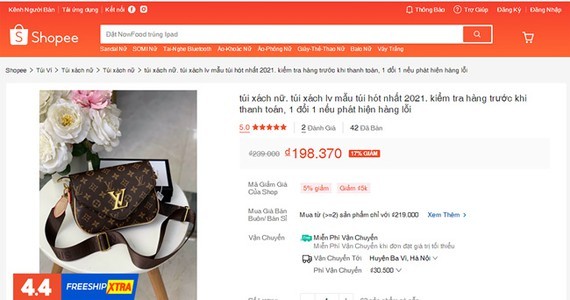
Ben Thanh Market, Dong Xuan Market and the e-commerce platform Shopee are on the USTR blacklist for selling counterfeited goods of unknown origin. For many years now, e-commerce platforms and online shops in Vietnam have long been criticized for selling counterfeited goods and pirated brand names. An online shopper looking to buy a Rolex watch on e-commerce platform Shopee can choose from many suppliers of the world-famous Swiss brand. Prices could range from just VND 250,000 to about VND 2 mn for a watch. It has never been so simple and easy to buy products of famous brands.
Similarly, shoppers may search for a Louis Vuitton or Gucci handbag on Shopee and easily find dozens of suppliers of these two famous brands at unbelievably low prices of just VND 100,000. When famous brands introduce a new product line, shoppers can almost immediately find such an article on an online store. The unreasonably low prices confirm the fact that all these brand names are actually all counterfeited products, yet the sellers blatantly publicize their products to buyers.
Such sales on counterfeit goods are not just commonplace on Shopee, but also on other famous online platforms like Lazada. Louis Vuitton handbags are being offered on Lazada for just a few hundred thousand Vietnam dong, and Nike brand shoes are being sold for only VND 100,000 a pair. Such cheap fake products are even being offered at discount rates.
Blatant sale of counterfeited products of world famous brands on e-commerce platforms in Vietnam may not come as a surprise to many. Not many Vietnamese businesses are even flabbergasted to find staggering numbers of fake items selling on e-commerce platforms. Not very long ago, Idocean, a business providing raw material for milk tea, said that its products have been selling on online platforms since 2019, and the company discovered that one of its bestselling items had been counterfeited and was being sold publicly by several suppliers on Shopee. Idocean spoke with Shopee about this issue, and the online platform blocked all providers of this fake product. However, the fake products are now back and selling once again on a lot of online shops.
Copyrights infringed
First News Publishing Company, Ltd. has also been struggling in its fight against fake books. It has even sued the online platform Lazada for helping fake book suppliers to sell fake items. Lots of book sellers infringe the copyrights that First News owns and sells such books at a discount on this platform. Consumers are deceived when they do their shopping online while companies like First News have seen their reputation ruined and their business performance seriously hurt.
These stories indicate that it is not without a valid reason that Shopee has been put on the USTR blacklist. This has also once again raised the alarm about constant concerns of legal traders who bend over backwards to comply with laws and regulations while providing services, and consumers who need to be protected from being duped into buying fake products from online shopping platforms.
Soon after USTR released its review, the Vietnam Directorate of Market Surveillance (DMS) responded. With regards to Shopee alone, the USTR review listed its whole system in many countries, including Vietnam. According to DMS investigation, Shopee Vietnam has a mechanism that deals with complaints about intellectual property rights, and it has procedures and measures in place that can control the products registered for sale and their suppliers.
This response from DMS can hardly convince the consumers that Shopee is reliable. If online platforms, and particularly Shopee in this case, can control the quality of the sellers and their products, then counterfeited goods would not flood the market. If they have a mechanism capable of satisfactorily handling complaints, then such companies need not have to justify why fake goods are continuing to sell on their platforms.
As a matter of fact, the problem of counterfeit goods on e-commerce platforms is not common only in Vietnam, yet we should admit the truth that too many fake products are sold publicly. It has been reported that several online platforms have signed commitments and pledged to say no to counterfeit good in their online shopping services. However, their commitments are just on paper, and the problem of counterfeiting and piracy is still beyond their control.
Some buyers know the products are fake, but they still want to buy them. Yet lots of other buyers do not know the products are fake, and when they find out the truth, it is extremely hard to file a complaint because of complicated formalities. Competent agencies have lots of difficulties because the online network is too large while legal regulations have not been revised to adapt to new changes in the online market.
The Ministry of Industry and Trade has prepared a draft to revise Decree 52/2013/ND-CP concerning e-commerce. People may wonder whether the revised decree will better manage the e-commerce market and if the e-commerce platforms will be able to fulfill their responsibilities and prevent counterfeiting and piracy.
It is true that laws and regulations may sometimes be unable to adapt to new changes, but laws are supposed to be more or less able to protect consumers and legal manufacturers and also prevent counterfeiting and piracy. The e-commerce platforms must stop focusing only on launching promotional campaigns with appealing discounts, and begin filtering out unfair and fraudulent business practices so as to become more answerable to customers.
























